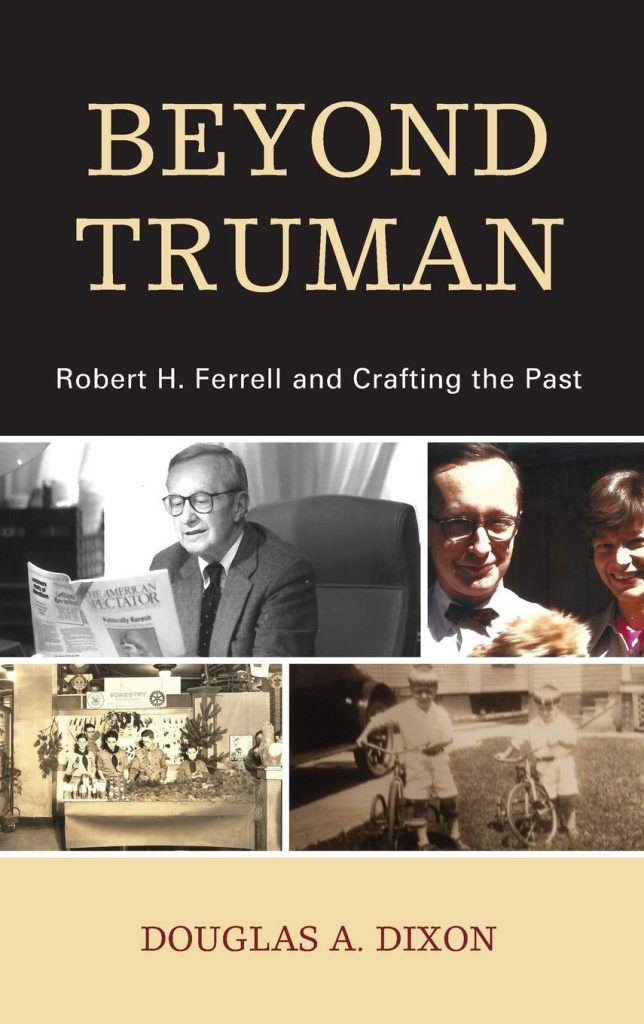Tags
Author: Brittany Von Kamp, recent graduate from the History M.A. program

When pursuing a publisher for his book manuscript Beyond Truman: Robert H. Ferrell and Crafting the Past (Rowman & Littlefield, 2020), author Dr. Douglas Dixon responded with a laugh—that several editors rejected the book’s thrust, saying: “Nobody cares about historians.” Dixon explained that this was a major hurdle in getting the book to readers who, in fact, do care about the challenges faced by past masters in doing history. What challenged Ferrell, as the field evolved into the twenty-first century was postmodernism, the New Left, and social and cultural history. Though Dixon feels Ferrell is an important person to study, the book is much more than merely a study of this important presidential, diplomatic, and military historian, though his biography is central to it. Instead, the author had to find a way to make Ferrell’s world larger than the historian himself, to fit Ferrell into the larger historical narrative – a task that many historians face as they write about their own research. In the end, Dixon says that “the book is not just about Ferrell; it’s about the larger culture of history and doing history,” particularly in the last half of the twentieth century to the present day.
But at BGSU, we have more connection to Robert Ferrell than his work as a historian and his role in the evolution of the practice of historians. Ferrell began his studies in history at Bowling Green State University. Due to the economic downturn of the Great Depression, Ferrell had to move with his family from Lakewood, Ohio, to a family farm down the road from Waterville, Ohio, when he was a teenager. Living in the local area during his teen years, BGSU was a convenient place for him to attend college. As a freshman at BGSU in 1939, he was enrolled as a music education major. But a break from school as a soldier in Europe during the Second World War heightened Ferrell’s interest in history. After finishing his music education degree in 1946, he continued at BGSU to earn a degree in history the following year.
After graduating from BGSU, Ferrell was accepted at Yale where he earned both a Master’s and PhD in history. He continued as a scholar and professor in the Midwest, teaching at Indiana University from 1953 to 1988, supervising 35 PhD students, and authoring and editing 60 books in his career, many after his retirement from IU. He wrote several prominent works on topics including World War I, President Harry Truman, and American foreign policy, including a decades-long hugely popular college textbook (American Diplomacy) and a best seller, Dear Bess. Dixon’s book highlights other Ferrell successes that put him in good stead with what some historians have identified as characteristics of the best in the field of history.
Though Ferrell’s time at BGSU may not have been long, especially compared to the rest of his career, it seems clear that his experiences here would have had at least some impact on his life. Dixon underscored this sentiment with evidence excavated at the Lilly Library archives at IU, for instance, several letters from Ferrell to one of his professors at Bowling Green, Walter Sanderlin, thanking him for the lifelong impact on his career and turn to history from music education. Beyond Truman’sauthor also explained that Ferrell was even somewhat critical of BGSU. Ferrell believed that in education programs, such as those at BGSU or IU or anywhere, students should take more content courses for the subject they wished to teach, greatly reducing the education-course requirements. Ferrell’s critiques found their way to state legislative reformers, university presidents, colleagues, and education reformers of the time. He certainly had plenty of skirmishes with the education department at IU. These controversies, beginning at BGSU, molded Ferrell’s beliefs, whether one sees them as positive or negative. Ferrell’s BGSU experiences more than likely guided the future scholar and his teaching and mentorship of students.
As Dixon demonstrates in his book, “the personal identity of a historian defines their biases – how they write, what they write.” This perfectly sums up Ferrell’s connections to Bowling Green State University. Regardless of the totality of his education or experiences, BGSU would always be a part of Robert Ferrell’s life and his identity. Whether writ large or small in his identity, BGSU has influenced his life and work as a historian, as illustrated in archival documents left to us.
Aside from personal experiences at BGSU, Robert Ferrell maintains a connection to the university today that continues to inspire and educate future historians, including myself. BGSU’s history professor Dr. Ben Greene was a student of Ferrell’s during his time at Indiana University. Dr. Greene explained that he began his college career intending to major in marketing, but in his first semester, he took one of Ferrell’s U.S. History survey courses. Greene attributes this course—and Ferrell—for his inspiration to become a historian: “His course immediately redirected me on the path that led me to where I am today.” Just as Robert Ferrell influenced Dr. Greene to become a historian, my own experiences have shown that Professor Greene inspires many of his own students just the same.
